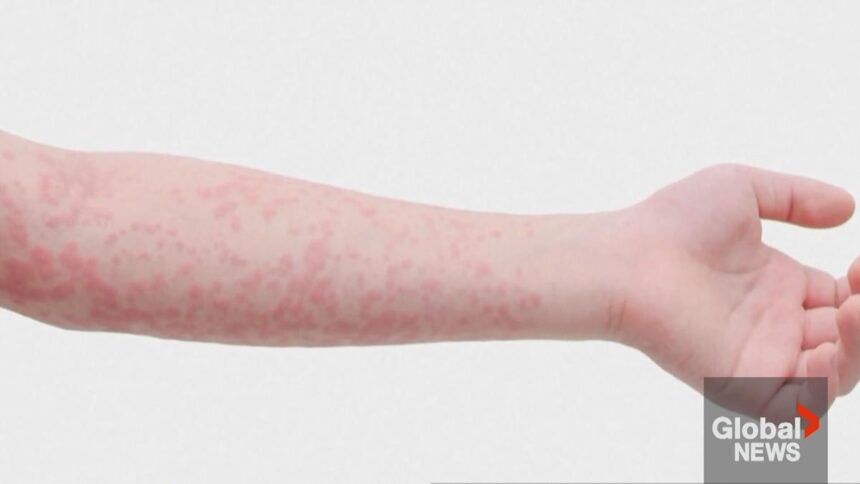The soft morning light filters through the curtains of Room 307 at Toronto’s Hospital for Sick Children, where a mother sits beside an incubator, her hand pressed against the transparent wall separating her from her newborn daughter. Born just nine days ago, the infant wears a tiny oxygen mask while medical staff monitor her vital signs. She represents one of six babies in Ontario diagnosed with congenital measles in 2024—a startling development in what public health officials are calling a deeply concerning trend.
“I did everything right during my pregnancy,” the mother whispers, requesting anonymity to protect her family’s privacy. “I took prenatal vitamins, avoided alcohol, ate healthy foods. I never imagined a disease I thought was eliminated would affect my baby.”
Congenital measles—measles transmitted from mother to child during pregnancy—had become exceedingly rare in Canada following decades of successful vaccination programs. But as immunization rates have declined in some communities, what was once considered a disease of the past has found new footholds.
Dr. Samantha Richardson, Chief of Infectious Diseases at SickKids, explains the severity of these cases. “When measles affects a developing fetus, the consequences can be devastating. We’re seeing infants with pneumonia, encephalitis, and other complications that can have lifelong impacts on their development.”
The six cases reported since January represent the highest number of congenital measles diagnoses in Ontario in more than 25 years, according to Public Health Ontario. The infants were born to mothers who contracted measles during pregnancy, most of whom were either unvaccinated or had unknown vaccination status.
When I visited the neonatal intensive care unit last week, the reality of these statistics became painfully human. Nurses moved efficiently between incubators, administering care to babies whose first days of life are marked by a preventable illness. One nurse, who has worked in the NICU for over two decades, told me she hadn’t treated a case of congenital measles until this year.
“It breaks my heart,” she said, adjusting an IV line. “These babies are fighting so hard, and they didn’t have to be in this situation.”
The resurgence of measles in Ontario mirrors a troubling global trend. The World Health Organization reported a 79% increase in measles cases worldwide in 2023 compared to the previous year. In Canada, vaccination hesitancy has grown in some communities, influenced by misinformation spread through social media and declining trust in health institutions.
Dr. Theresa Tam, Canada’s Chief Public Health Officer, addressed the situation in a press conference last week. “We’re seeing the consequences of vaccination gaps that developed during the pandemic when routine immunizations were missed or delayed. Combined with growing vaccine hesitancy, we’ve created vulnerable pockets in our population.”
For the families affected, the statistics and public health warnings have become deeply personal realities. In Hamilton, James and Eliza Nguyen’s son was diagnosed with congenital measles shortly after birth in March. Eliza contracted measles during her third trimester after being exposed at a community event.
“We thought measles was something from history books,” James told me during a phone interview, his voice cracking. “Now our son is facing developmental challenges that could affect him for life. If we could go back in time and make sure everyone around us was vaccinated, we would.”
The MMR vaccine, which protects against measles, mumps, and rubella, is considered one of the safest and most effective vaccines available. Two doses provide approximately 97% protection against measles infection. However, pregnant women cannot receive the live-virus vaccine, making them vulnerable if they haven’t been previously immunized.
This vulnerability creates what Dr. Marina Cohen, an obstetrician at Mount Sinai Hospital, calls “a critical gap in protection.”
“Pregnant women rely on community immunity—the protection that comes when enough people around them are vaccinated,” Dr. Cohen explains. “When that immunity breaks down, we see the consequences most dramatically in our most vulnerable populations, including newborns.”
The Ontario Ministry of Health has responded to the outbreak by launching targeted vaccination campaigns in communities with low immunization rates. Mobile clinics have been established in several regions, and public health nurses are conducting outreach to pregnant women and families with young children.
“We need to rebuild the trust in vaccines that has eroded in recent years,” says Dr. Kieran Moore, Ontario’s Chief Medical Officer of Health. “These six babies are suffering needlessly from a disease we have the tools to prevent.”
For Indigenous communities in Ontario, the measles outbreaks have raised additional concerns. Elder Winona Flamand from the Mississaugas of the Credit First Nation has been working with community health workers to ensure accurate information reaches families.
“Our communities have historical reasons to be wary of government health initiatives,” Flamand acknowledges. “But we also have traditional knowledge that recognizes the importance of protecting the collective. Our elders remember when these diseases took our children. We don’t want to return to those times.”
The current situation reflects the delicate balance between individual choice and community responsibility. Dr. Richardson from SickKids emphasizes that vaccination is not just a personal decision.
“When you choose to vaccinate, you’re protecting not only yourself or your child but also vulnerable people in your community who cannot be vaccinated—including pregnant women and their unborn babies.”
For the parents of the six affected infants, the road ahead remains uncertain. Some babies will recover completely, while others may face long-term health challenges. What unites them is the knowledge that their children’s suffering might have been prevented through higher vaccination rates.
As the afternoon sun moves across Room 307, the mother gently sings to her daughter through the incubator wall. “I want other pregnant women to know this can happen,” she says quietly. “I want them to be protected in ways I wasn’t.”
Outside the hospital windows, spring unfolds across Toronto—a season of renewal that these families hope will extend to their newborns, as they fight a disease from the past that has found its way, unwelcomed, into the present.






